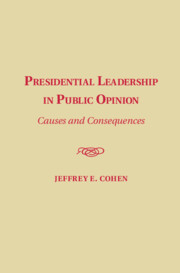Book contents
- Frontmatter
- Contents
- Figures
- Tables
- Acknowledgments
- 1 The Many Meanings of Presidential Leadership
- 2 Evidence of the Public Demand for Presidential Leadership
- 3 Congressional Sources of the President's Leadership Image
- 4 Success in Congress and Perceptions of Presidential Strength
- 5 Presidential Representation and Public Opinion
- 6 Presidential Leadership and Presidential Elections
- 7 Perceptions of Presidential Leadership, Trust in Government, and Attitudes toward Congress
- 8 Presidential Leadership, Public Opinion, and American Democracy
- Sources
- Index
7 - Perceptions of Presidential Leadership, Trust in Government, and Attitudes toward Congress
Published online by Cambridge University Press: 05 May 2015
- Frontmatter
- Contents
- Figures
- Tables
- Acknowledgments
- 1 The Many Meanings of Presidential Leadership
- 2 Evidence of the Public Demand for Presidential Leadership
- 3 Congressional Sources of the President's Leadership Image
- 4 Success in Congress and Perceptions of Presidential Strength
- 5 Presidential Representation and Public Opinion
- 6 Presidential Leadership and Presidential Elections
- 7 Perceptions of Presidential Leadership, Trust in Government, and Attitudes toward Congress
- 8 Presidential Leadership, Public Opinion, and American Democracy
- Sources
- Index
Summary
The previous two chapters explored the implications of presidential leadership on presidential approval and elections. Results of the analyses in those chapters found that both of the dimensions of presidential leadership – strength and representation – affected voters' job approval ratings and election decisions. It is probably not too surprising that presidential leadership qualities will affect presidential job approval and voting in presidential elections, although, somewhat unexpectedly, the presidential leadership variables displaced and/or significantly weakened approval as a predictor of voting behavior.
This chapter continues with the question of the implications of presidential leadership, looking at its effects beyond the presidency – in particular, the effect on trust in government and attitudes toward Congress. An assumption of this study is that public perceptions of presidential leadership are fundamental, that voters tend to generalize their perceptions about the president beyond the presidency, onto the larger political system. It is necessary, however, to test that assumption.
This chapter proceeds as follows. The first part of this chapter looks at trust in government, while the second half looks at attitudes toward Congress, employing the previously developed analytical strategies. Foreshadowing the results, perceptions of presidential leadership strongly influence trust in government and attitudes toward Congress. When the president is considered strong and representative, voters are more trusting of government, they like Congress better, and they even like their own representative better.
POLITICAL TRUST: MEANING AND CONTROVERSIES
Political trust is a general evaluation of voters' feelings toward government. It is distinguishable from the policy preferences that voters hold and attitudes toward incumbents or government policies. In representative political systems, trust of those in power is consequential because citizens do not directly make public policies but elect others to do so for them. Political trust links the citizen to the larger political system and has been found to have important consequences for citizens and the political system. Research suggests that trust in government may affect political participation, electoral support for incumbents in office, compliance with laws once enacted, and whether government can implement policy reform (Hetherington 2004).
- Type
- Chapter
- Information
- Presidential Leadership in Public OpinionCauses and Consequences, pp. 156 - 180Publisher: Cambridge University PressPrint publication year: 2015



